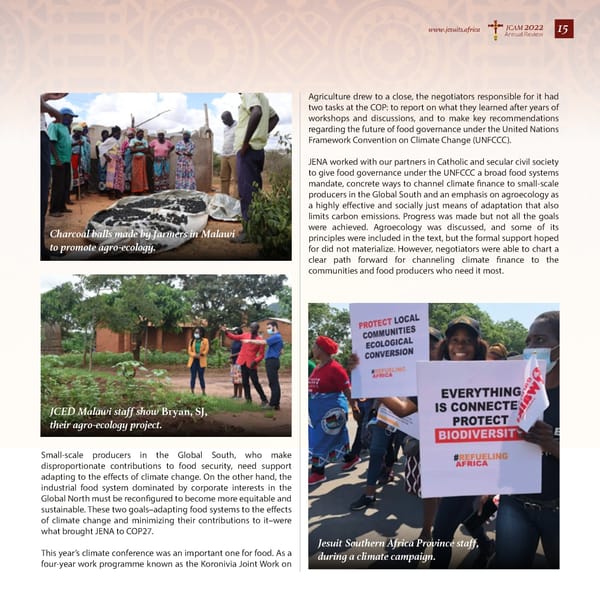www.jesuits.africa JCAM 2022 Annual Review 15 Agriculture drew to a close, the negotiators responsible for it had two tasks at the COP: to report on what they learned after years of workshops and discussions, and to make key recommendations regarding the future of food governance under the United Nations Framework Convention on Climate Change (UNFCCC). JENA worked with our partners in Catholic and secular civil society to give food governance under the UNFCCC a broad food systems mandate, concrete ways to channel climate finance to small-scale producers in the Global South and an emphasis on agroecology as a highly effective and socially just means of adaptation that also limits carbon emissions. Progress was made but not all the goals Charcoal balls made by farmers in Malawi were achieved. Agroecology was discussed, and some of its to promote agro-ecology. principles were included in the text, but the formal support hoped for did not materialize. However, negotiators were able to chart a clear path forward for channeling climate finance to the communities and food producers who need it most. JCED Malawi staff show Bryan, SJ, their agro-ecology project. Small-scale producers in the Global South, who make disproportionate contributions to food security, need support adapting to the effects of climate change. On the other hand, the industrial food system dominated by corporate interests in the Global North must be reconfigured to become more equitable and sustainable. These two goals–adapting food systems to the effects of climate change and minimizing their contributions to it–were what brought JENA to COP27. Jesuit Southern Africa Province staff, This year’s climate conference was an important one for food. As a during a climate campaign. four-year work programme known as the Koronivia Joint Work on
 Jesuits Africa Annual Review 2022 Page 14 Page 16
Jesuits Africa Annual Review 2022 Page 14 Page 16